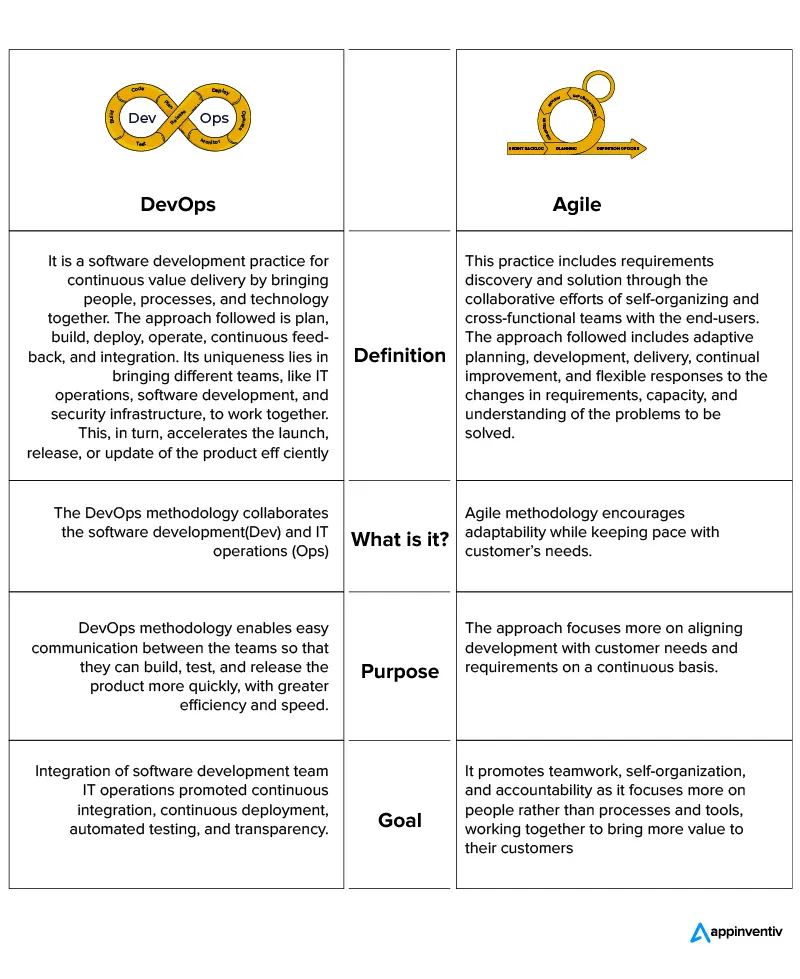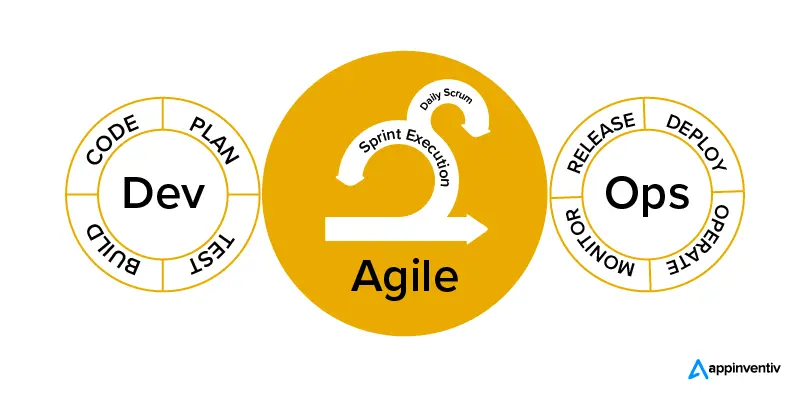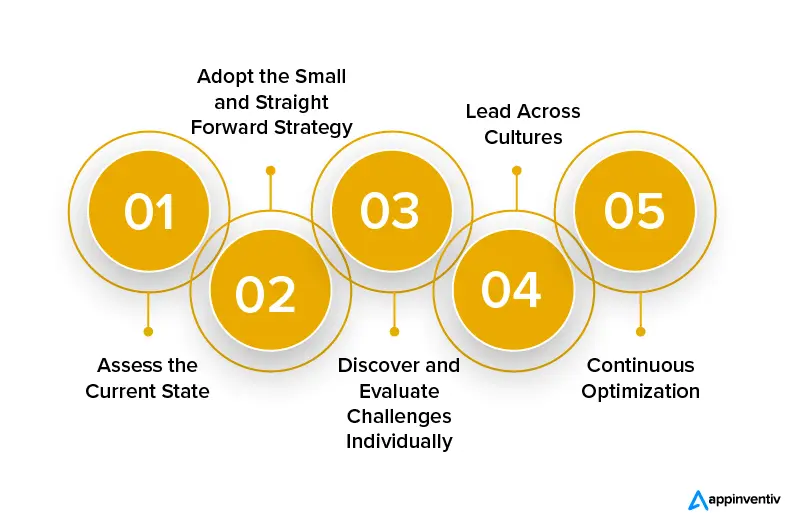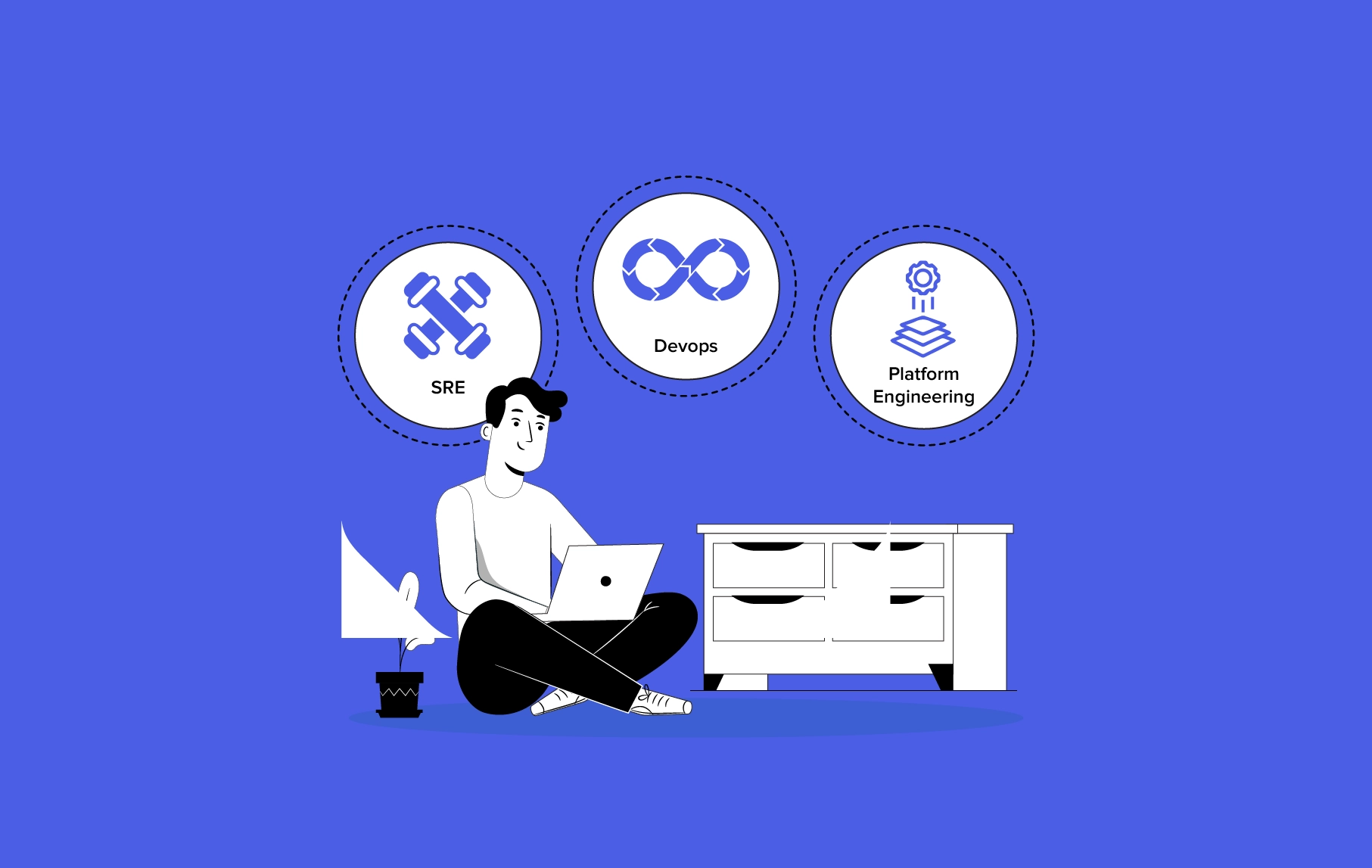- What is Agile DevOps?
- DevOps vs Agile
- DevOps vs Agile: Similarities and Differences
- What can be Achieved by Integrating DevOps and Agile?
- Points to Consider when Integrating Agile and Devops
- Seamless Teamwork Flow
- Defining the Software Lifecycle
- DevOps Adoption in Sprints
- Quality Assurance
- Implement Service Backlog Under DevOps
- Leveraging the Right Tools
- Automation
- Documentation
- Measurement and Analysis
- 5 Ways to Use DevOps and Agile Services Together
- Assess the Current State
- Adopt the Small and Straight Forward Strategy
- Discover and Evaluate Challenges Individually
- Lead Across Cultures
- Continuous Optimization
- What Benefits can Appinventiv Bring to the Table?
- Wrap Up!
In today’s fast-paced technological development and deliveries, companies focus on accelerated deliveries while maintaining high customer value. DevOps and Agile are two different technologies focused on delivering the same output.
The primary function of the DevOps application is to reduce the number of steps during the software development process for faster delivery of the software into the market. Of course, the scalability of the software, deployment of the software, and its monitoring and maintenance are also kept in focus while its implementation. Simply put, software development and IT operations work together to bring down the software implementation delivery time.
On the other hand, Agile software development is more focused on software development to increase the velocity of project delivery. As mentioned earlier, the end goal is similar. Thus, combining the two, making it Agile DevOps, will help overcome the challenges and shortcomings of each other with benefits like faster delivery, and higher customer satisfaction resulting in higher revenue and profit growth.
What is Agile DevOps?
To bring two technologies together, we must understand both of them individually, which in turn, will help us understand how well they can gel with each other.
Both DevOps and Agile are the modern software development practices that are designed to produce a part of a product, launch, or release, the approaches they follow are different. Let us try and compare the approaches that the two practices follow:
DevOps vs Agile

DevOps vs Agile: Similarities and Differences
Now that we have understood What is DevOps methodology and Agile methodology, understanding the similarities and differences will help us in understanding Agile DevOps better.
Difference: The scheduling of the process followed is different from one another.
- Agile employs weekly or monthly sprints to set features to be created during this sprint.
- DevOps sets multiple schedules for deployment to minimize the associated business impact.
Similarities: Both, Agile and DevOps methodologies complement each other and thus can work in tandem.
- Agile rapidly adapts to changing requirements while collaborating better between the smaller teams
- DevOps enables continuous automated integration and deployment to enable frequent releases while collaborating better between the smaller teams.
- When applied in tandem, Agile DevOps enables significantly faster development and deployment while keeping the customer’s needs at the forefront. Continuous feedback and integration become quicker and easier.
Having understood the benefits and similarities, it is advised to choose the resources carefully as in larger organizations, the cultural work methodology differences might create hindrances and friction amongst the teams.
What can be Achieved by Integrating DevOps and Agile?
Integrating DevOps and Agile will lead to greater business performance. The organizations that are embracing Agile DevOps practices are seeing approximately 60% growth in their revenue. It is almost 2.4 times more than their counterparts that are growing at a rate of over 20%. The major benefits of bringing two approaches together are listed below:
- Process releases are simplified and product offerings are improved
- Allows maximized collaboration
- Implementation of continuous integration/delivery pipeline
- More value and fewer risks in every release
- Fewer bugs and faster fixes
- Increased visibility
- Higher customer satisfaction rates
- More qualitative products

Points to Consider when Integrating Agile and Devops
For smooth integration, we have listed some of the challenges you might encounter while implementing Agile DevOps along with the methods to overcome them.
Seamless Teamwork Flow
To get the maximum DevOps business value and the Agile’s practical approach, the team members must have a broader understanding of all developmental aspects.
All the stakeholders of the project including the product owner, scrum master, system admin, and operations manager, need to necessarily consider and contribute not only to the development process but also to delivery and maintenance.
Teams must have a deeper understanding of the service, management, environment provisioning, release cycles, automation tools, and application integration.
Defining the Software Lifecycle
The product or the software lifecycle can be defined as successfully attempting the DevOps implementation plan with an Agile framework. If DevOps principles are implemented at the beginning of the project development, it will increase consistency, and reduce costs by minimizing the errors, thus speeding up the product delivery/service to market.
DevOps Adoption in Sprints
As explained in the differences between Agile vs DevOps, Agile workflow is divided into weekly or monthly sprints. It becomes imperative to align DevOps methodology while handling Agile sprints.
Follow the below-mentioned instructions as you start working the DevOps approach into your sprints.
- Ensure the presence of all the stakeholders at the planning stage
- Discuss product functionality and operability features
- Include the DevOps team in backlog planning, daily meetings, and review sprints for better alignment
Quality Assurance
Ensuring that there are no bugs by performing regular quality checks will rule out the possibility of errors at every stage. As the Agile framework should be regularly tested for its functionality, the DevOps approach should be checked for performance and load testing of the software. It is equally important to test the quality parameters as continuous development.
Implement Service Backlog Under DevOps
When implementing Agile and DevOps, it is important to rebuild the service backlogging process. DevOps structure must include the following elements
- Scalability of the software
- Integration efficiencies
- Service monitoring
- Logging
- Alert setting
- Testing capability
- Security and compliance aspects
Leveraging the Right Tools
The use of the right tools leads to the successful adoption of Agile and DevOps into software development. The software development configuration tool helps in creating and replicating the framework using IaaC (Infrastructure as a Code) that is needed for DevOps. With this, you can deploy the application on different platforms while saving repeated work efforts.
Automation
Automation helps dramatically reduce the scope of errors. The same concept applies while integrating Agile and DevOps. Artifacts should be restored to a repository to simplify the release cycles. Lesser errors with automation will lead to the enhanced overall productivity of the team.
Also read- How can automation be used to ensure security and compliance in business?
Documentation
Agile DevOps is bringing together the best of Agile DevOps methodologies. Adopting the documentation process from DevOps enables the team to document the whole process until the software release. This can come in handy for future use.
Measurement and Analysis
Keeping track of certain metrics helps in understanding the performance and progress of the workflow which, in turn, helps in multiple successful release cycles. As per Scrum Alliance Organization, some of the parameters that should be kept track of are listed below:
- Time taken from production to release
- Percentage of release date adherences
- Percentage increase in release numbers
- Support requirements/defects in any platform
- Percentage of NRFs (Non-functional requirements) met
Additional measurement and analysis parameters can be set based on your business requirements as well.
[Also Read: Why is DevOps a Good Investment for your Enterprise?]
5 Ways to Use DevOps and Agile Services Together
As mentioned earlier, the integration of DevOps and Agile processes will enhance the customer experience along with quick deliveries of the project to the market. Their conjunction redefines the path of digital transformation. To ensure effective transformation, follow the below-mentioned steps:

Assess the Current State
The clarity on the current state of the organization will help you create a roadmap for transformative steps. The current state primarily includes cultural readiness, leadership responsibilities, previous implementations, and the IT service management process.
Adopt the Small and Straight Forward Strategy
Take baby steps. Start with creating MVP (Minimum Viable Product) to add value to the organization, customers, and employees with the help of quick processes and supporting technologies.
Discover and Evaluate Challenges Individually
No problem is too small to be ignored. Address the smallest of the problem also and use the best-suited principles and practices. The best known is automation as it reduces the possible errors by increasing efficiency and enhancing employee satisfaction.
Lead Across Cultures
Bringing Agile andDevOps together is like merging two different cultures. It becomes the responsibility of the leaders to support and enable this cultural change in the two methodologies. By facilitating and encouraging employees to understand and get accustomed to the new changes, you bring the best to the process.
Continuous Optimization
There is no such thing as a perfect solution. There will always be some scope for improvement. It is best to remain competitive and prepared for the new uncertainties. Thus, continuous optimization of software, processes, tools and transformative efforts are required.
By following the steps mentioned above, bring successful digital transformation to your organization and measure and analyze the performance and the overall progress.
What Benefits can Appinventiv Bring to the Table?
Successful product development or digital transformation of an organization requires the expertise of handling the projects with thorough understanding, planning, and technical know-how.
At Appinventiv, the team strives to deliver the best technology solutions. With a strong clientele base and almost a decade of experience, we are a fast-growing software development company providing Agile DevOps and cloud consulting solutions.
For instance, Appinventiv leveraged the transformation of a US-based Telecom Company with its proven analytics optimization and agile execution. The created ecosystem could process high volumes of data accurately and classify it according to customer behavior and preferences.
Reach out to our experts to discuss your requirements for quality Agile DevOps solutions.
[Also Read: DevOps Adoption And Implementation: From Application To Enterprise]
Wrap Up!
Integration of software development and IT operations (DevOps) effectively deliver top-quality products and services on a continuous basis. Agile brings agility by enabling small and quick changes as per the client’s requirements. By merging the two, DevOps Agile, companies can reap the benefit of exponential growth of the organization, both in terms of customer experience and growth in revenue.
FAQs
Q. Are Agile and DevOps the same?
A. Agile and DevOps are two different approaches/methodologies used for project deliveries. However, Agile can be used as a part of DevOps.
The Agile approach focuses on fulfilling the customers’ needs and requirements.
DevOps approach focuses on ease of communication between the team to deliver the projects with greater efficiency and speed.
Q. How do Agile and DevOps Interrelate?
A. DevOps brings together the two teams that used to work in their silos to increase the velocity of software development and release. While the Agile team works in smaller groups so that they can react quickly as per customer requirements. In other words, DevOps creates the software, and the Agile team tests it and deploys it.
Q. What are the challenges in bringing the two approaches together?
A. The major difference between Agile and DevOps is the culture that they work in. The Agile team works in small teams whereas DevOps, as the name suggests, is the integration of development and operations teams. To merge the two methodologies, the team and the leadership should be well prepared to face the challenge in the way cross-functional teams will have to work together for smooth and quick delivery of the projects.



SRE vs DevOps vs Platform Engineering - A Comparative Analysis for Enterprises
In the fast-paced landscape of modern IT, enterprises face the important challenge of navigating and optimizing their operational frameworks. Three particularly prominent methodologies in this transformative journey are Site Reliability Engineering (SRE), DevOps, and Platform Engineering. Each approach has its own principles, advantages, and potential pitfalls, highlighting the diverse strategies available for businesses to enhance…

Measuring DevOps Success in the Enterprise with DORA Metrics
Digital transformation has turned nearly all businesses into software enterprises, empowering them to deliver cutting-edge solutions to meet evolving market needs. However, software development is a complex process involving multiple DevOps teams to work in different silos on a big project. These teams can be spread worldwide, making it challenging to track who is doing…

Ten Ways DevOps as a Service Fuels Innovation and Propels Growth for Enterprises
The set of principles that revolved around development and operations and appeared around 2009 has now become the usual development approach for most software-focused businesses. Well, yes, we are talking about DevOps as a Service. The COVID-19 pandemic forced businesses to rapidly adjust their operations to remote work environments, manage the disruptions caused, and maintain…







